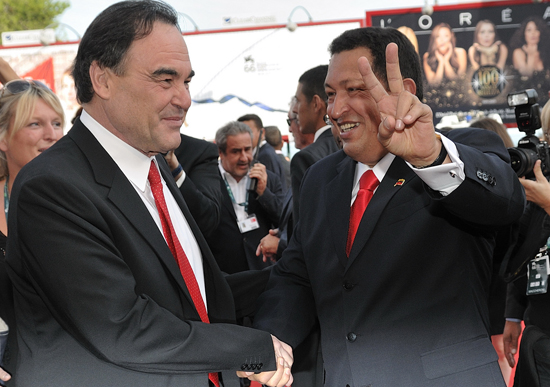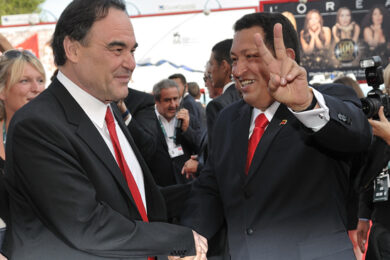Oliver Stone seems to be under the impression that he’s a journalist…
Unfortunately for him, though, there’s a small problem with making documentaries as opposed to his bread and butter biopics: the inaccuracies, omissions and dramatised humbling of iconic figures that he can get away with in fictionalised accounts such as JFK, Nixon, W or even The Doors just don’t come across very well when depictions of reality are the goal.
If the intention is to balance out some unacceptably lopsided scales, the logical route is to turn tables steadfast in the other direction. At least that’s the approach that director Stone is taking with his latest left-leaning political jaunt, South of the Border, and he’s been receiving a hefty dose of stick for his troubles. The film – which only barely made screens in the US – has already been torn to pieces by the US media that it rails against and is receiving, at best, mixed reviews in the UK. The director has had to come to constant defence of this sympathetic rendering of South American politics as critic after critic presents him with the journalistic equivalent of waving hands frantically in front of his rose-tinted glasses.
Talking to reporters in London, Stone was certainly in high spirits for someone at the center of such controversy, even going so far as to compliment one journalist on her underwear ("I like your red brassiere" he says to the dubiously clad woman in the front row). He talked about future projects (naming Mahmoud Ahmadinejad and Kim Jong Il as possible future film subjects as well as mentioning his ambitious, upcoming 10-part series, The Secret History of America ) , made some sweeping generalisations about US presidents (Bush: "a man without a clue [with] a certain charm", Obama: "Bush light") but mostly what he wanted to do was wax lyrical on politics.
South of the Border is decidedly left of the center. And, taking the Michael Moore approach, is honestly unbalanced. Rather than fighting journalistic bias with journalistic integrity, Stone opts to fight fire and brimstone with playful banter and projected sentimentality.
The film documents Stone’s tour around South America’s socialist leaning countries and includes personal interviews with most of their leaders. It also focuses heavily upon US influence in the countries as well as the view of South American politics that is to be gained through US media coverage, particularly that which looks at Venezuela’s president Hugo Chavez and also particularly that which is depicted by Fox News.
The film would pass as an ‘untold side of a story’ scenario if it wasn’t for several slightly contrived attempts at humanizing the socialist leaders – many of whom are depicted as tyrants in the global media. Watching Hugo Chavez riding a decrepit bicycle round the poverty stricken community in which he was raised or seeing Evo Morales playing a spot of casual footie outside his lavish estate doesn’t do much to endear the viewer to the respective politicians’ leadership skills. Besides this, Fox News proves too easy a target when it comes to Western media – they make even Stone come to look like a hero of objectivity.
Stone comes across a push-over in the film, a polite houseguest, a buddy to anyone and everyone who feels the wrath of Fox News’ ignorant belligerence. His interviewing skills are virtually non-existent as he is so loathe to press his subjects that he might as well just let their PR advisors do the talking. As a matter of fact, the hardest hitting question Stone asks – the only one that receives any amount of affront or rise out of his interviewee – is his inquiry as to how many pairs of shoes Argentinean president Cristina Kirchner owns. Kirchner, who understandably retorts with questions of sexism, is subsequently branded as ‘feisty’ by her interviewer.
The film does indeed explain facts and scenarios that have otherwise gone unreported, under reported or have been manipulated in some shape or form in the western media, but the sheer lack of opposing opinions is astounding; inevitably eroding trust in the director. Anyone who has been exposed to ‘the other side’ of this grapple for the truth will leave feeling infinitely more confused than when they went in.



